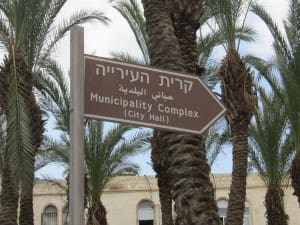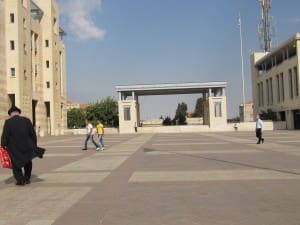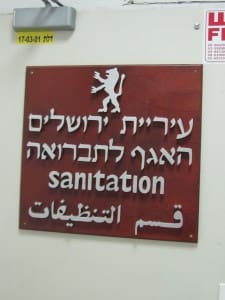This is Part 2 of my interview with Janan Abdu, wife of Palestinian political prisoner Ameer Makhoul. In this segment, Janan talks about how Ameer’s imprisonment has changed her personally and about the challenges facing thousands of Palestinian women whose husbands, sons and brothers are jailed for political reasons. Enjoy!
It was a pleasure speaking with Janan Abdu, wife of Palestinian political prisoner Ameer Makhoul (who is a colleague and a friend) about Ameer, political prisoners in Israeli jails, and the rights of Palestinian citizens of Israel. Enjoy!
Things I love about Jerusalem #1
“Extra large?” The shop owner holds up the soft, pink pajamas I’ve brought to the register. “For you?” (He is surprised because I am very small.)
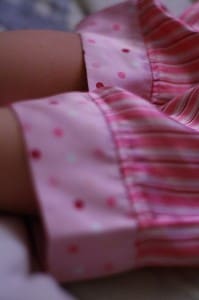
“No, for my friend’s daughter.”
“Is she fat?” he asks. He uses the word descriptively not as an insult.
(I realize this conversation reminds me of buying meat. I point to the cut I want and ask for half kilo, but the butcher insists on knowing what I’m cooking before he agrees to sell it to me.)
“No, she’s not fat,” I indulge the man’s curiosity. “She’s tiny.” I hold up my pinky finger to indicate that the girl is a stick. It’s true. Her eyes have started to bulge over her sunken cheeks. I tremble slightly and the shop owner notices.
“Why, sister, are you buying an extra large pajama if the girl is small?”
“Her mother told me to buy extra large.”
“Is she tall?”
I hesitate. I image her lying in the pale green hospital gown with the hospital sheet over her bony knees. “I’m not sure,” I confess. “I’ve only seen her lying down.” (This is not exactly true. I met her at her aunt’s wedding some months ago. But there were hundreds of women there, and I don’t remember meeting her. Who knew that she would come to play such a prominent role in my life?)
There is a pause.
“The girl is sick?” he says, compassion flooding his face. I nod. “She’s only eighteen,” I say to fill up the silence pressing on my throat.
“You have done me a favor!” he bursts out, startling me. He puts the extra large pajamas in a bag and slides them across the glass counter. “I try to do good every day, but I don’t always find an opportunity.”
I begin to shake my head, embarrassed by what I think he is saying, but he continues: “Please take these to her. Please do it as a favor to me. Let me do this good thing today.”
“No, I can’t accept that. I came to buy the pajamas. I can pay for them.” I fumble with my purse.
“But you are already doing good for her. You are visiting her, right? And you’re going to take her the pajamas?” He’s practically begging.
“Yes, but…”
“So let me do something good, too. Let these pajamas be from me.”
Our eyes meet and I know how he feels: powerless to make a difference, desperate to contribute something meaningful to this suffering world. I nod and clutch the pajamas to my chest so my emotions won’t spill out onto his tile floor.
Two days later, I’m sitting on the edge of the hospital bed and I ask about the pajamas. The girl’s mom smiles awkwardly. “She’s lost a lot of weight,” she says, having discovered for herself what the rest of us already knew.
“I’ll exchange them,” I say, reaching for the bag that she’s put in a box under the hospital bed.
“It’s too much trouble for you.”
“Please…” I say, “let me do something good. Please?”
And she let me.
Things I Hate About Jerusalem #2
I hate the untenable situation faced by the Jerusalem hospitals serving Palestinians. The problem isn’t theoretical. It’s real. It affects people.
A Friend of a Friend is Bleeding from Her Brain
A couple of weeks ago, a friend of a friend got an excruciating headache and started vomiting and seizing. The family rushed her to a clinic in their remote West Bank village, and the clinic put her in an ambulance and sent her to Rafidia Hospital, Nablus’ largest. Rafidia’s doctors decided to send her to St. Joseph’s Hospital in Jerusalem. But getting out of the West Bank and into Israeli-controlled Jerusalem requires “coordination” (the Palestinian Authority and Israeli officials must agree to allow this patient to reach the hospital) and it requires a referral (the Palestinian Authority must agree to pay for the care).
It took three days for the girl to get the paperwork she needed to go to Jerusalem. Three days! At least she got approval – not everyone does. And after all that, the coordination wasn’t done properly. Since West Bank ambulances aren’t allowed to enter Jerusalem, patients (or corpses) are transferred out of the back of one ambulance into the back of another. But no Israeli ambulance was waiting at Qalandia checkpoint, and the girl, with tubes draining fluid from her brain, had to wait.
At St. Joseph’s (locally known as the French Hospital), the girl was put in intensive care. The surgeon who cares for her is renown for his excellence, and the nurses are dedicated and caring. But that wasn’t enough to get her an MRI. It was ordered on a Thursday but the Palestinian Authority Ministry of Health was on strike – they didn’t even answer the phones! After the strike, they couldn’t find the referral request due to the backlog. When they finally approved the referral and the MRI was scheduled, six days had gone by. Six more days!
The Patient’s Mother Sits on a White Plastic Chair
Meanwhile, the Israelis have refused requests from the girl’s father or any other relative to enter Jerusalem to visit or provide support. Is that legal? I really don’t know. He’s in the village with their other children while the girl’s mother sits next to her daughter on a white plastic chair. The chair is uncomfortable, but not as uncomfortable as the whole situation: Why should a mother be forced to make big decisions alone, deal by herself with confusing medical information, not to mention trying to handle her fear, sitting by her daughter’s side alone day after day?
Given that the French Hospital treats severely ill patients from the West Bank and Gaza, and given that each patient is allowed one accompanier or perhaps two in some cases, you would think the hospital would make it more comfortable for those who are far from home with absolutely no local connections. These are people who left home with their sick loved one in an urgent situation – they didn’t think to bring a change of clothes or a toothbrush or a magazine to read.
Of course, some people are fortunate enough to pay for private rooms, but there is no place for family members of patients in intensive care. I feel terrible seeing patients’ family members sitting on those plastic chairs all day long, often sleeping there. Sometimes women lie down in the public waiting room where men also sleep. There is no shower, so they wash the best they can in the public bathroom. People may be sent clothes and blankets, but there’s no place to wash and dry them. There is no locker, so people’s belongings, crammed into multiple plastic bags, are stuffed into the corner of the public area where there is a high rate of theft. The hospital has a small kiosk they call a cafeteria, but when the lone worker goes home, there is no more coffee, no more sandwiches. There is no refrigerator to store families’ food or drink, and no microwave to heat up leftovers.
The Patients’ Families are Sick Too
Due to the nature of the patients’ conditions, family members may wait weeks or even months while their loved one gets care. They are stuck in Jerusalem, a place many of them can’t move without risking arrest by police (they don’t have permission to wander around), and there are no stores or restaurants in close walking distance of the hospital. Not to mention that most of these folks are poor, very poor. Having a loved one in treatment is one more major drain on their already strained finances. Imagine having to shell out an extra $10 or $20 dollars a day on food for the accompanier.
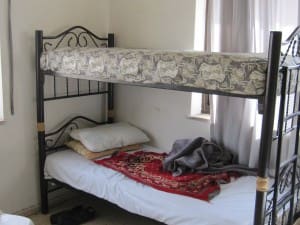
According to the General Administrator of the Hospital, Jamil Koussa, the Hospital tries to support families, though he wishes they could do more. They have a small room and bathroom where men can sleep (70% of the accompaniers are men), but other efforts he’s made have been met by sabotage – stolen blankets, broken beds, and more. “Someone even stole the faucet handles on the sink in the accompaniers’ room,” Jamil Koussa told me.
Why? Why would people whose loved ones are in the care of the Hospital, and who are receiving generosity from the Hospital, act in such uncivil ways?
These patients’ families are sick, too. On my daily visits to the hospital, I have met many of them. Having been imprisoned for so long under the restrictions of occupation, they find themselves in the place they most dreamed about but thought they’d never visit – Jerusalem. Many of them are overwhelmed and desperate and scared and excited. Their normal social networks – the ones that have kept them alive through decades of occupation and siege – are out of reach; sometimes they beg and sometimes they harass. Many of the families of the patients in the hospital are sick too – sick of occupation – and they have no one to care for them while they wait to find out if their loved one will live or die. This situation would bring out the worst in anyone.
The Hospital is Sick; the System is Sick
St. Joseph’s Hospital, owned by a Catholic religious order, has 73 beds and is a referral hospital for the Palestinian Authority Ministry of Health in neurosurgery, coronary care, and urology. On average 60% of the patients are from Gaza and 40% from the West Bank. Some of their patients are covered by Israeli insurance, but the Israeli HMO system (cupat holim) doesn’t pay the French Hospital the full reimbursement rate set by the Israeli Ministry of Health. The French Hospital gets only 40% of what Israeli hospitals get.
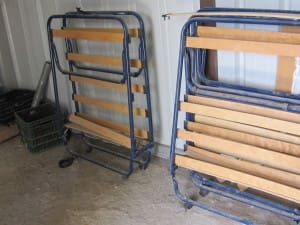
Even the Palestinian Authority pays more – they pay 60% of the rate set by the Israeli Ministry of Health. At least that’s what they agree to pay. Jamil Koussa has only seen 273,000 NIS (about $70,300) out of the 10 million NIS ($2,580,000) that the Palestinian Authority owes. They haven’t paid since the beginning of 2012.
How is this hospital supposed to function? They have 140 employees, though they should have 180. Even Jamil Koussa himself is doing multiple jobs (general director, fundraising, public relations, and finance and administration), and it shows in the stress on his face. “I already put three doctors into one room and now I’ve added a transcriptionist in the same room.” My heart goes out to this man. When I suggested that perhaps the hospital could use a social worker to help the families of patients, Jamil Koussa pushed back, “I can barely take care of the patients. You want me to take care of their families, too?”
The Whole Situation Makes Me Sick
I go to the hospital every day, but I don’t stay long. It hurts to feel so helpless. I wish I could help her, but I know she’s in good hands medically. What’s left for me to do is figure out how to help the hospital. These people are doing life-saving work under conditions made difficult by an indefensible military occupation. The whole situation makes me sick.
I sat crying
I pull out of Beit Hanina, the East Jerusalem suburb where I live, and turn onto the main road towards Ramallah. Traffic is light. It is only 6:30 am. In less than one hour, cars will fill the street and spill onto the sidewalks like raspberry, orange and grape candies forgotten to rot and collect dust. They will elbow their way through the roundabout, the space between them only big enough for gusts of black exhaust to escape into the Jerusalem air.
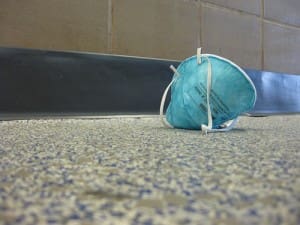
The drivers, having not yet reached the place where the old man sells thick Arabic coffee in plastic cups, will be half-asleep. They will wake briefly to battle for their territory when the lanes merge from three to two, then from two to one. When their tires clang over the row of metal spikes that signal there is no going back, they will blink and see the reality before them: soldiers with automatic weapons on the left ignore cars traveling from Jerusalem to the West Bank but check each car trying to enter Jerusalem from the West Bank. There is a line of Fiats and Fords snaking alongside the separation wall all the way past the refugee camp. Teachers, laborers, secretaries, nurses, salesmen, students. They will light up cigarettes and wait for their turn to enter Jerusalem—if they are deemed legitimate, acceptable, human.
But it was only 6:30 am, and I was spared. The checkpoint was nearly empty. I rolled down my window and enjoyed the crisp October air, a brief respite between the washed out heat of summer and the smell-of-damp-concrete winter. Then I saw him stepping off the curb.
A man, perhaps in his early thirties, slightly overweight, light brown pants, brown-green shirt. In his arms, a full-grown woman, mid-twenties, average height and weight, black pants and black blouse, her eyes tired, a blue surgical mask over her mouth. She looked weak but she was conscious. I stopped my car the second I saw them. The man nodded to acknowledge my courtesy. My mouth dropped open and tears sprung to my eyes. He crossed the street in front of me, a small entourage of women carrying bags behind him.
And then I was crying. Cars behind me honked, but I sat crying. The man and his wife/sister/neighbor/friend had disappeared into the mob of cars going the opposite direction. Was he trying to take her to a doctor in Jerusalem? Was he going to stand in the two-hour line? How would he pass through the turnstyle holding a full-grown woman like a baby in his arms? Had she left children at home? Did they see daddy carrying mommy through the streets? Were they crying?
Things I Hate about Jerusalem #1
I hate this trash container:
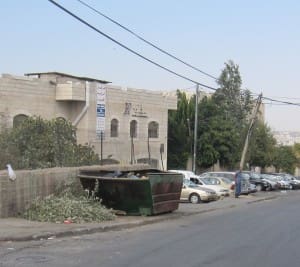
This trash container sits on the block where my youngest daughter goes to school. Can you see the school just beyond the trees on the left? It’s a big school: thirteen grades with 3-5 over-enrolled classes per grade. Hundreds of children have to get to and from the school every day, their parents negotiating the narrow street made even more narrow by the volume of traffic, and the fact that there only about 15 parking spaces so parents park on the sidewalk and double park on the street during drop off and pick up times.
The school is in East Jerusalem – the part of Jerusalem that Israel annexed illegally and has cut off from the rest of the West Bank with an 8-meter high concrete separation wall, checkpoints, and Jewish settlements. Palestinian Jerusalemites pay taxes to the Jerusalem Municipality, part of the Israeli governmental system, but the services we get are inferior. This trash container symbolizes, for me, that Palestinians in Jerusalem are, at best, neglected.
Notice that the trash container, like many others, fills the entire sidewalk. That means that pedestrians who need to pass by the trash container have to step into the street. Watch a few seconds of this video (by clicking on the image below) to see the result: Children step into the street; cars come from behind them at very close proximity and often too fast.
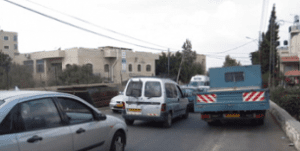
Accidents do happen, and I didn’t want anyone to get hurt. So yesterday I took myself down to the Jerusalem Municipality to ask the sanitation folks to move the trash container to a safer location.
I entered the parking structure and leaned out my window to ask the guard if I was in the right place. He shouted (I think), “Pay when you leave!” so I drove down 5 levels and parked. All the signs were in Hebrew – no English (okay) and no Arabic (despite that it is also an official language of Israel). I made my way through the beautiful open square all the while thinking “we don’t have such nice landscaping on our side of town.”
Several different, friendly Israelis directed me to the sanitation department.
But none of the professional staff spoke Arabic or English. I attracted a small crowd of employees who chattered loudly to one another and waved their hands not knowing what to do with me. Finally a janitor came forward to translate. I explained to him about the trash container. He explained it to them. They told me to call 106 and make a complaint, but that I needed the street name and address. Street name? We don’t use street names. Addresses? We call the buildings by the name of the owner. I told them it was near the school and that would have to do. When I doubted that the complaint line staff would speak Arabic, the woman picked up the phone on her desk and dialed. She pushed this and that and handed me the phone: “I selected Arabic,” she told me through my trusty janitor friend. I waited. There were many announcements in Hebrew and I was supposed to press something, but who knows what. The woman hung up and called again.
The woman got me into an Arabic queue, but the operator who answered didn’t speak Arabic. Luckily, she spoke English. I asked her to arrange to move the trash container to a location where it would not require children to walk in front of moving cars. “Get the record number!” the woman who was helping me said, but the operator on the phone didn’t want to give it to me, or maybe she didn’t know what I was talking about, or maybe I didn’t know what I was talking about. I handed the phone to the woman at the desk and she wrote down the number.
I retraced my steps (again noting the big, beautiful expanse of public open space) and got my car. Five levels up, I couldn’t get out of the lot. You have to pay 12 shekels at the machine on the first floor. Is that what he meant by “Pay when you go out”? I had to go re-park my car again! And of course the parking ticket machine on the first floor is in Hebrew and Russian. Luckily another nice Israeli came along. Not only did he work the machine for me, he also gave me change for the only bill I had, which was too large for the machine.
Wouldn’t you know it? The exit put me heading straight into the heart of busy West Jerusalem traffic, the opposite direction to where I live. It took 25 minutes to turn around. I am not exaggerating. By the time I got home, I was exhausted. I’d been gone for hours. I have a PhD but the whole experience made me feel as if I had regressed to first grade. It is no wonder that Palestinians do not like to engage with the Municipality or any official Israeli body. The system is not meant to serve anyone, but especially not Palestinians, and no one makes any effort to hide that fact.
My complaint number? It’s 16737.
Guest Post: Thirty-nine Pounds of Sorrow by Vicki Tamoush
One of my close friends called today to say, “I know this is pretty bold of me, but I was wondering if you’re going to cure olives again this year. I’ve been craving them so. Could you give me two jars this time?”
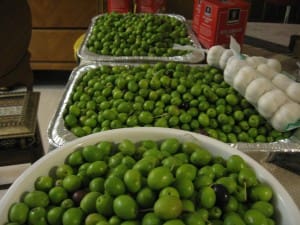
My dear friend isn’t Arab–she’s just got a taste for olives. She has no idea what goes through my mind while I’m picking and sorting through the bins of fresh olives at the Arabic market in my southern California neighborhood. She couldn’t imagine what I think about while I’m hauling home 39 pounds of them, washing and cracking them on my kitchen counter, tossing away most of the leaves and twigs but keeping a few “because it’s good for them to stay together” as my grandmother used to say.
It’s olive harvest season in Palestine, but so many of the laden branches will go unpicked or be crushed under an Israeli bulldozer while farmers weep in the distance. These trees, many of them quite ancient, stand in stately rows while their fruit develops over the course of months. And when the moment is just right and the olives are still “hard, but not too hard, habibti,” it’s important to pick them to arrest the ripening process so that they will cure to a consistent flavor throughout the batch.
The practice of bulldozing olive groves or setting them on fire began some years ago as one of the many measures of collective punishment imposed by the Israeli Defense Forces (IDF). The first time I saw pictures of trees being crushed under military bulldozers, I wept out loud. Knowing the decades of devoted attention given to those gnarled branches, it looked to me like a picture of babies being smashed to death. I still feel sick whenever I hear that a grove was destroyed by soldiers on the night before harvest. It’s so different than hearing that the trees were uprooted by a flood or succumbed to some soil-borne virus. This is murder.
Olive trees are among a handful of sources from which Palestinians can earn a livelihood even under occupation. If a family is lucky enough to still maintain control of their land (as opposed to simply holding title through a virtually worthless deed), they can raise crops or animals, but both require regular access to water which of course has been redirected away from Palestinian villages in many cases. Olives, however, will grow robustly with only sun and the rain gifted by God. Olive trees give rise not only to the olive industry but oil, soap, and, now, wood carvings lovingly fashioned from the wood of trees murdered in the night. Praying hands, figurines of the magi, latticed stands for the Holy Qur’an reveal the knot holes from the fruit-bearing branches from which they were wrested.
These days, it’s fairly easy to find groups of Americans or Europeans traveling to Palestine to assist with the olive harvest. Rather than exploring traditional tourist sites, these folks come prepared to work hard, sometimes even sleeping among the trees along with the farmers in order to guard the grove.
Not that they could fend off the soldiers. Not that anyone could.
As has been proven year after agonizing year, nothing can fend off the soldiers. Or the settlers.
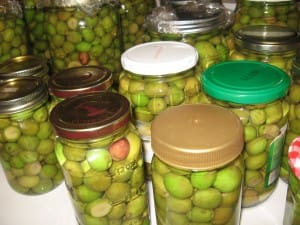
So yes, I tell my dear friend: I can certainly promise you two jars of olives this year. Maybe three. It’s a painstaking, labor-intensive process that I happily undertake each autumn, distributing dozens of jars among my family and friends at Christmastime. I do it because I can. And I do it for the women who can’t; the women who, along with their families, watched their trees carefully to determine just to right time for harvest, but who woke in the night to the sound of thunder. Or so they thought.
And here’s a bonus picture of me (Nora) picking olives in Palestine:
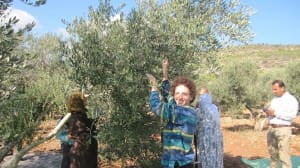
Perhaps the most important work I’ve ever done…
Over years of work in Palestine, I’ve spoken with hundreds of people about their experiences with international aid. I’ve written articles and delivered presentations and worked on committees, but I don’t see any real changes happening. Most recently, meetings and discussions with Palestinians led to this draft document — criteria for distinguishing aid that should be accepted from aid that should be rejected. It’s perhaps the most important work I’ve ever done. Why? Because it shifts our entire focus away from what we want “them” (donors) to do, which is not in our control, to a focus on what “we” (the Palestinian community) agree to participate in, which is something in our control. It is a draft document intended as a discussion starter. Please, read it carefully and share your thoughts.
INTERNATIONAL ASSISTANCE THAT ADVANCES PALESTINIAN SELF-DETERMINATION IS ACCEPTED
International assistance that advances Palestinian self-determination:
• consistently and explicitly opposes occupation and colonization and puts into practice policies that challenge structural inequality;
• complies with international law and prosecutes those who break it;
• actively challenges Israeli impunity through sanctions and political pressure;
• is actively committed to real democracy, including the right of all Palestinians to choose their own leaders, participate in political life, and receive benefits – regardless of political opinion or affiliation;
• recognizes the unity of the Palestinian community as a whole and aligns policies toward Palestinians in the West Bank (including Jerusalem and Area C), Gaza, Israel, refugee camps, and the Diaspora toward the goal of self-determination;
• respects Palestinians’ right to resist oppression including through means such as Boycott, Divestment and Sanctions;
• leverages coherent political, economic and cultural policies to protect Palestinians, Palestinian rights and Palestinian resources;
• conceptualizes “development” as a way of realizing rights, and respects the right and responsibility of Palestinians to lead the process;
• implements Palestinians’ rights to allocate their own development resources including resources spent on their behalf; and
• provides information about its activities, including budgets, and engages in mechanisms whereby it can be held accountable by local people.
Moreover, international assistance that advances Palestinian self-determination seeks to:
• eliminate the diversion of Palestinian aid funds to international NGOs or international private sector vendors;
• intervene only when local actors cannot, and avoid duplication of or competition with local actors;
• stop the payment of any aid funds to Israeli governmental organizations or to Israeli private sector organizations when there is a Palestinian or international alternative;
• prevent waste of resources on experts that do not add to local knowledge, are overpaid, and are not selected by locals; and
• refrain from unethical practices including corruption, breaking commitments, paying beneficiaries for training, favoritism, double standards, stealing projects, etc.
INTERNATIONAL ASSISTANCE THAT UNDERMINES PALESTINIAN SELF-DETERMINATION IS REJECTED
International assistance that undermines Palestinian self-determination:
• enables Israel to avoid paying costs for which it is responsible as occupier according to international law;
• is not accompanied by active political support for Palestinian self-determination;
• is palliative, “humanitarian,” short-term, or in the form of loans
• demands that Palestinians police one another;
• requires activities that benefit Israel or that decrease pressure on Israel to change its policies;
• supports economic or cultural “solutions” that do not include political rights;
• is based on priorities or strategies developed by non-Palestinians;
• relies on foreign-chosen or installed Palestinians to speak on behalf of the community as a whole;
• wastes funds on “capacity building” that isn’t requested and tied to self-determination;
• requires Palestinians to use foreign languages, frameworks and waste money; and
• disrespects local traditions and beliefs.
Should Palestinians Boycott International Aid?
I’m proud to announce that two important articles of mine were published today:
“Should Palestinians Boycott International Aid?” is available on The Guardian. It’s a short piece that argues that international aid actors are not going to reform their policies; Palestinians need to refuse aid that is detrimental. It quickly generated over 100 comments, so they’ve already closed to new comments. Leave your comments here instead.
Also,
“Aid on Palestinian Terms: The Case for a Boycott” is available on the Palestine Studies Group. It’s a longer article that describes how I went from being an advocate of aid to a critic of aid to an activist for aid reform and now to a critic of aid reform.
These articles grew out of conversations with Palestinians in which we drafted criteria that could be used to distinguish between aid that should be accepted from aid that should be rejected.
The Guardian article was reprinted in Al-Quds Online in Arabic and in the print edition on October 19, 2012. There will be an Arabic version of the longer article published soon. Let me know if you’d like a notification.
Thanks for your interest and support.
Airing Palestinian Dirty Laundry. Wanna Come Help Wash?
“I hope someone kills me before I do another festival ever again. I am at this point hoping and praying to survive….”
This came in an email from a friend who is planning a Palestinian village cultural festival. She’s suffering not just from the amount of work it requires—organizing space, booking cultural performers, recruiting community participation, raising money for it all, publicizing it—but also from the pressure.
On one hand, there is enormous pressure to succeed. A well-implemented cultural festival can bring international and local attention to far-flung villages. It can attract visitors who spend money on local products. It can offer local and international cultural enrichment (singers, dancers, poets). It can draw donors, sponsorships and other kinds of tangible support.
So when volunteers from the community take initiative to put on a cultural festival, it’s a gift of energy and enthusiasm and lots of hard work. It’s a gift to the villagers who experience the direct consequences of occupation (having land and natural resources confiscated by Israel; attacks by army and settlers), and who suffer from high unemployment, infrastructural deficits (water, sewer and electricity), closed markets, isolation, and the range of social and emotional problems that go along with having no hope and feeling like everyone has forgotten you to rot. (No I’m not exaggerating.) It’s a gift to the rest of us who get to visit places we might never have heard of, taste their maftool, stock up on their homemade soap.
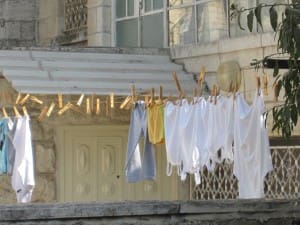 So why, in addition to the pressure to succeed, is there also so much pressure from the community to fail?
So why, in addition to the pressure to succeed, is there also so much pressure from the community to fail?
I’ve heard about situations where the villagers themselves try to sabotage the cultural festival: They take on tasks and don’t do them. They criticize every decision, even if it was made collectively. They try to slander the leaders of the event. They even come to the event and make a mess and refuse to help clean up. Why??
I’ve had the same experience myself in some Palestinian community projects. In one situation, people working on the project began to fight among themselves. They brought others on to their side against the project. They badmouthed the project and sometimes lied – even while they were still active beneficiaries. They ultimately managed to close the project so no one could benefit.
Why??? It isn’t logical! (I know this isn’t pleasant, but we have to talk about our problems in order to solve them.)
Some people say it’s internalized oppression, depression, greed, jealousy, competition, poor breeding. I really don’t know.
I do know that we have a lot of excellent, hardworking community-minded volunteers and we should be supporting them and affirming them, not wearing them down and burning them out.
That’s what I intend to do – get more involved in local events, help spread the word, help them realize their potential for success. To start with, I will be at the Taybeh Oktoberfest this October 6 and 7 from 11 am to 10 pm (directions on taybehbeer.com and taybehmunicipality.org). You don’t need to drink beer if you don’t want to. Just come and enjoy the cultural presentations, buy the local products, and enjoy the historic village.
Also, there is a list of annual cultural festivals and other events of interest at http://visitpalestine.ps/en/discover-palestine/festivals-and-cultural-events. There are monthly updates about local events at www.ThisWeekInPalestine.com. And, there are visits to farms and community gardens organized by Sharaka – Community Supported Agriculture and others. There is so much that is good going on!
Will you help support Palestinian cultural festivals by attending? Will you join your voice with mine to thank and recognize Palestinian volunteers who give of their time and effort to bring joy and benefit to villages despite very difficult circumstances? Will you help counter the tendency towards negativity by working constructively to make things better in Palestine?
To whet your appetite, here’s a draft schedule of events:
Saturday October 6th
11:00 am – Opening Celebration with ecumenical prayer and national anthem; welcome by Honorable David C. Khoury, Mayor of Taybeh; Musikkapelle Leobendorf (band from Bavaria); Greek Orthodox School Folklore Show; The SUN (band from Italy); Taybeh Folklore Dance Group; Trio Dona Zefa (band from Brazil)
1:15 pm – Musikkapelle Leobendorf (band from Bavaria)
2:00 pm – Taybeh Walk (starts at Taybeh Brewery)
2:15 pm – Sri Lanka Traditional Dance and Classical Drums
2:15 The French-German mobile library for children together with Tamer-Institute present story telling (30 min) with Salwa, face painting and other activities for children at the Mobile Library in the bus (open until 5 pm)
2:30 pm – Trio Dona Zefa (band from Brazil)
2:30 pm – Visit the Nasr Priestly Home founded in 1568 built on caves and cisterns (open until 6 pm)
3:00 pm – Yalla Yalla Parade in front of municipality road
3 pm – Have fun watching Ramallah Street Hockey in the Latin School Yard (until 7 pm)
3pm – Experience German in 20 minutes or less! Fun taster lessons in German with Anja! At entrance to Municipality Grounds, preschool building left side (also at 4pm and 5pm)
3:30 pm – “Yalla Farah” Al Harah Theater (Beit Jala)
4pm – “From West to East: A Taybeh Art Exhibition” View works of two diverse and distinct artists sharing the same common thread of being Palestinian. At: Greek Catholic Church Hall (to 8 pm)
4:30 pm – Taybeh Beer Competition with Madees Khoury, Palestinian female brewer
5:00 pm – The SUN (band from Italy)
6:00 pm – DAM – Palestinian Hip Hop
7:00 pm – Al Raseef (Ramallah)
8:00 pm – Taybeh Folklore Dance Group
8:30 pm – Ramallah Orthodox Club
Ongoing – Take a nice walk in the old city to enjoy the amazing Palestinian architecture preserved by RIWAQ and stop by Peter’s Place, home of Holylanders Society for the Preservation of Christian Heritage; View the Taybeh Heritage Exhibition and other hand crafted design jewelry.
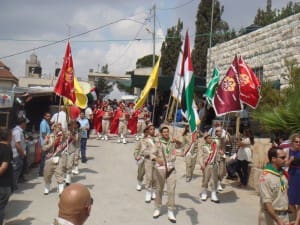
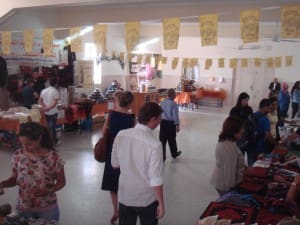
Sunday October 7th
11 am – Meet the artists Nabeel Hanna Muaddi and Issa Zawahreh “From West to East: A Taybeh Art Exhibition” View works of two diverse and distinct artists sharing the same common thread of being Palestinian. At: Greek Catholic Church Hall (to 8 pm)
11:30 am – Palestinian Circus School
12:15 pm – Hakaya Children’s Program with Fidaa Ataya
1:00 pm – Musikkapelle Leobendorf (band from Bavaria)
2:15 The French-German mobile library for children together with Tamer-Institute present story telling (30 min) with Salwa, face painting and other activities for children at the Mobile Library in the bus (open until 5 pm)
3:00 pm – German fun taster lessons (until 5 pm)
2:00 pm – Taybeh Walk (starts at Taybeh Brewery)
2:00 pm – Taybeh Beer Competition with Madees Khoury, Palestinian female brewer
2:30 pm – Visit the Nasr Priestly Home founded in 1568 built on caves and cisterns (open until 6 pm)
3:00 pm – Yallah Yallah Parade in front of municipality road
3:00 pm – The SUN (band from Italy)
3pm – Experience German in 20 minutes or less! Fun taster lessons in German with Anja! At entrance to Municipality Grounds, preschool building left side (also at 4pm and 5pm)
4:00 pm – Palestinian Circus School
4:30 pm – X Games (Qalqilia)
5:00 pm – Toot Ard (Golan Heights)
6:00 pm – Al-Rowwad Culture and Theater Society
7:00 pm – Qalandia Blues (Jerusalem)
8:00 pm – Taybeh Folklore Dance Group
8:30 pm – Luminaries (USA) and X Games (Qalqilia)
See you there?
- « Previous Page
- 1
- …
- 10
- 11
- 12
- 13
- 14
- …
- 16
- Next Page »
